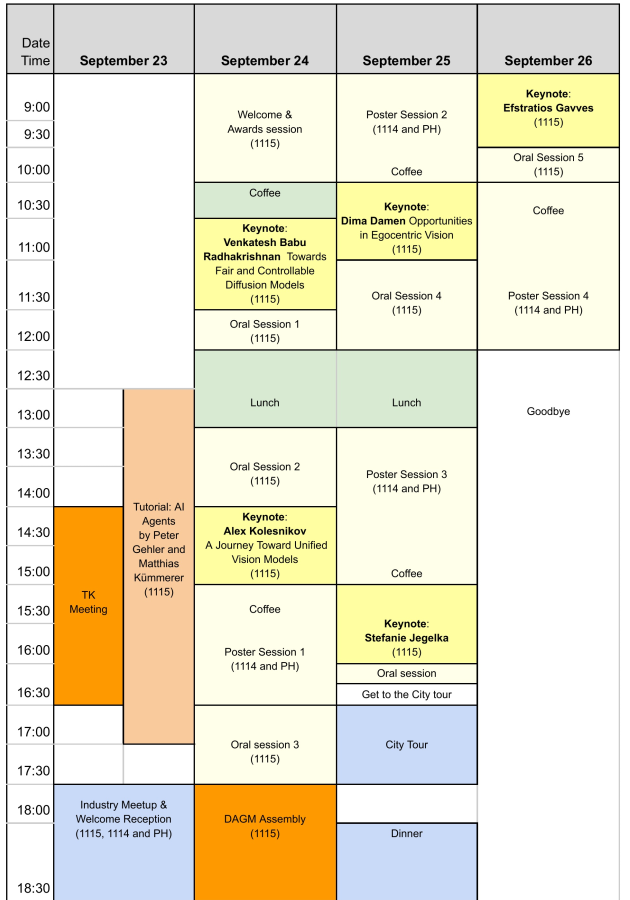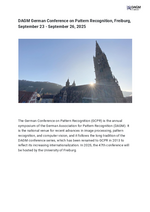DAGM GCPR | 2025
DAGM German Conference on Pattern Recognition, Freiburg

Overview

Tuesday 23.9.
13:00-17:30 Tutorial: AI Agents
Matthias Kümmerer, Linus Schneider, Jaisidh Singh, Robin Ruff, Mamen Chembakasseril, Peter Gehler
13:00-15:00 Presentation
15:00-15:30 Coffee Break
15:30-17:30 Hands-on
Always wanted to learn what AI Agents are about but never got the time? Join our half-day tutorial on LangGraph, LangChain, and the Model Context Protocol (MCP)—three puzzle pieces that snap together to turn large-language-model theory into fully fledged, experiment-ready agents. We open with explanations of all software packages and their concepts and have some examples. Then we dive straight into hands-on hacking where you will write your own AI agent or MCP host.
Bring a laptop, your favorite IDE, and an LLM key (we can provide an LLM key). If you have an idea about what you would like to code, bring that as well, otherwise we have some examples to work on together. This tutorial is both instructional and hands-on, your chance to get started with agentic frameworks. Let’s learn together.
17:30 Welcome Reception and Industry Meet-up
The Welcome Reception is sponsored by Zeiss and the Industry Meet-up is organized and sponsored by the Tübingen AI Center.
17:30 Entry
18:00 Impulse presentation by SPRIN-D
18:20 Company pitches
19:00 Welcome Reception with Industry posters
Participation from Carl Zeiss, MVTec, Zalando, neura-robotics, Bosch, scholar-inbox, KI macht Schule, KI Allianz BW, Deep Scenario, Viscoda, Zebracat AI
Along with the welcome reception of the conference we host an industry meet-up, where local companies, sponsors, and academia can meet and talk. Many German vision professors, PhD and Master students, and researchers will be present. There will be plenty of time to talk with a glass of wine, a bottle of beer, or a bottle of lemonade. We expect 150-200 people.
If you are a local company and you are interested to join, please contact the industry chair.
Wednesday 24.9.
9:00 Opening and Awards
9:00 Opening
9:15 Award talk
10:00 Award talk
10:30 Coffee break
11:00 Keynote: Venkatesh Babu Radhakrishnan - Towards Fair and Controllable Diffusion Models
12:00 Oral Session 1
-
VisualChef: Generating Visual Aids in Cooking via Mask Inpainting
Kuzyk, Oleh; Li, Zuoyue; Pollefeys, Marc; Wang, Xi -
Investigating Structural Pruning and Recovery Techniques for Compressing Multimodal Large Language Models: An Empirical Study
Huang, Yiran; Thede, Lukas; Mancini, Massimiliano; Xu, Wenjia; Akata, Zeynep
12:30 Lunch break
University Cafeteria Rempartstraße 18 (opposite to the conference site)
Bring the voucher from your registration package.
13:30 Afternoon session
13:30 Oral Session 2
-
Assessing Foundation Models for Mold Colony Detection with Limited Training Data
Pichler, Henrik; Keuper, Janis; Copping, Matthew -
Out-of-Distribution Detection in LiDAR Semantic Segmentation Using Epistemic Uncertainty from Hierarchical GMMs
Shojaei Miandashti, Hanieh; Brenner, Claus -
LADB: Latent Aligned Diffusion Bridges for Semi-Supervised Domain Translation
Wang, Xuqin; Wu, Tao; Zhang, Yanfeng; Liu, Lu; Wang, Dong; Sun, Mingwei; Wang, Yongliang; Zeller, Niclas; Cremers, Daniel -
Activation Subspaces for Out-of-Distribution Detection
Zöngür, Barış; Hesse, Robin; Roth, Stefan
14:30 Keynote: Alex Kolesnikov - Title: A Journey Toward Unified Vision Models
15:30 Coffee break
15:30 Poster Session 1
17:00 Oral Session 3
-
Video Object Segmentation-aware Audio Generation
Viertola, Ilpo; Iashin, Vladimir; Rahtu, Esa -
Combining Absolute and Semi-Generalized Relative Poses for Visual Localization
Panek, Vojtech; Sattler, Torsten; Kukelova, Zuzana -
sshELF: Single-Shot Hierarchical Extrapolation of Latent Features for 3D Reconstruction from Sparse-Views
Najafli, Eyvaz; Kästingschäfer, Marius; Bernhard, Sebastian; Brox, Thomas; Geiger, Andreas -
VGGSounder: Audio-Visual Evaluations for Foundation Models
Zverev, Daniil; Wiedemer, Thaddäus; Prabhu, Ameya; Bethge, Matthias; Brendel, Wieland; Koepke, A. Sophia
Thursday 25.9.
9:00 Morning session
9:00 Poster Session 2
10:00 Coffee break
10:30 Keynote: Dima Damen - Opportunities in Egocentric Vision
11:30 Oral Session 4
-
MCUCoder: Adaptive Bitrate Learned Video Compression for IoT Devices
Hojjat, Ali; Haberer, Janek; Landsiedel, Olaf -
CoProU-VO: Combining Projected Uncertainty for End-to-End Unsupervised Monocular Visual Odometry
Xie, Jingchao; Dhaouadi, Oussema; Chen, Weirong; Meier, Johannes; Kaiser, Jacques; Cremers, Daniel -
Deep Learning-Assisted Dynamic Mode Decomposition for Non-resonant Background Removal in CARS Spectroscopy
Chalain Valapil, Adithya Ashok; Messerschmidt, Carl; Shadaydeh, Maha; Schmitt, Michael; Popp, Jürgen; Denzler, Joachim -
Spatial Reasoning with Denoising Models
Wewer, Christopher; Pogodzinski, Bartlomiej; Schiele, Bernt; Lenssen, Jan
12:30 Lunch break
University Cafeteria Rempartstraße 18 (opposite to the conference site)
Bring the voucher from your registration package.
13:30 Afternoon session
13:30 Poster Session 3
15:00 Coffee break
15:30 Keynote: Stefanie Jegelka - Title: Does computational structure tell us about deep learning? Some thoughts and examples
16:30 Oral Session
- Unlocking In-Context Learning for Natural Datasets Beyond Language Modelling, Bratulić, Jelena; Mittal, Sudhanshu; Hoffmann, David; Böhm, Samuel; Schirrmeister, Robin; Ball, Tonio; Rupprecht, Christian; Brox, Thomas
17:00 Guided City Tour
The meeting point will be at "Platz der Alten Synagoge", just next to the conference venue.
18:30 Conference Dinner
The conference dinner is sponsored by Black Forest Labs.
It is at Dattler Schlossbergrestaurant on the Schlossberg with a nice view over Freiburg. You can either walk up the hill to the restaurant or you can take the cog railway from Stadtgarten. See venue for the map. You must bring your badge.
Friday 26.9.
9:00 Morning session
9:00 Keynote: Efstratios Gavves - Cyberphysical World Models and Agents
Abstract: Artificial intelligence has moved from passive perception to active interaction, yet current systems remain limited in their ability to reason about the physical and causal structure of the world. We propose cyberphysical world models as a new paradigm that unites perception with governing mechanisms of dynamics and causality. These models go beyond appearance-based representations by encoding the properties, interactions, and consequences that underpin real-world processes. Building on digital twins, mechanistic neural networks, and scalable causal learning, I will be describing a vision –and recent works—towards embodied agents that can predict outcomes, plan interventions, and adapt through curiosity-driven exploration. The resulting cyberphysical agents will be offering a pathway toward reliable, trustworthy, and autonomous systems, bridging the gap between data-driven learning and the physical world.
10:00 Oral Session 5
-
Using Knowledge Graphs to harvest datasets for efficient CLIP model training
Ging, Simon; Walter, Sebastian; Bratulić, Jelena; Dienert, Johannes; Bast, Hannah; Brox, Thomas -
Feed-Forward SceneDINO for Unsupervised Semantic Scene Completion
Jevtić, Aleksandar; Reich, Christoph; Wimbauer, Felix; Hahn, Oliver; Rupprecht, Christian; Roth, Stefan; Cremers, Daniel
10:30 Coffee break
10:30 Poster Session 4
